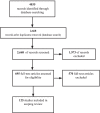A scoping review of the evaluation and effectiveness of technical assistance
- PMID: 35765107
- PMCID: PMC9238031
- DOI: 10.1186/s43058-022-00314-1
A scoping review of the evaluation and effectiveness of technical assistance
Abstract
Background: Although the benefits of evidence-based practices (EBPs) for advancing community outcomes are well-recognized, challenges with the uptake of EBPs are considerable. Technical assistance (TA) is a core capacity building strategy that has been widely used to support EBP implementation and other community development and improvement efforts. Yet despite growing reliance on TA, no reviews have systematically examined the evaluation of TA across varying implementation contexts and capacity building aims. This study draws on two decades of peer-reviewed publications to summarize the evidence on the evaluation and effectiveness of TA.
Methods: Guided by Arksey and O'Malley's six-stage methodological framework, we used a scoping review methodology to map research on TA evaluation. We included peer-reviewed articles published in English between 2000 and 2020. Our search involved five databases: Business Source Complete, Cumulative Index to Nursing and Allied Health Literature (CINAHL), Education Resources Information Center (ERIC), PsycInfo, and PubMed.
Results: A total of 125 evaluation research studies met the study criteria. Findings indicate that publications have increased over the last two decades, signaling a growth in the recognition and reporting of TA. Technical assistance is being implemented across diverse settings, often serving socially vulnerable and under-resourced populations. Most evaluation research studies involved summative evaluations, with TA outcomes mostly reported at the organizational level. Only 5% of the studies examined sustainability of TA outcomes. This review also demonstrates that there is a lack of consistent standards regarding the definition of TA and the level of reporting across relevant TA evaluation categories (e.g., cadence of contact, and directionality).
Conclusions: Advances in the science and practice of TA hinge on understanding what aspects of TA are effective and when, how, and for whom these aspects of TA are effective. Addressing these core questions requires (i) a standard definition for TA; (ii) more robust and rigorous evaluation research designs that involve comparison groups and assessment of direct, indirect, and longitudinal outcomes; (iii) increased use of reliable and objective TA measures; and (iv) development of reporting standards. We view this scoping review as a foundation for improving the state of the science and practice of evaluating TA.
Keywords: Capacity building; Scoping review; TA; Technical assistance; Technical assistance effectiveness; Technical assistance evaluation.
© 2022. The Author(s).
Conflict of interest statement
The authors declare no competing interests.
Figures
References
-
- Peterson JC, Rogers EM, Cunningham-Sabo L, Davis SM. A framework for research utilization applied to seven case studies. Am J Prev Med. 2007;33:21–34. - PubMed
Publication types
LinkOut - more resources
Full Text Sources
Miscellaneous



